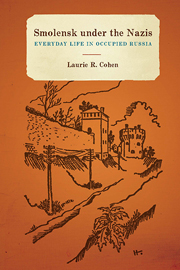Book contents
- Frontmatter
- Contents
- Acknowledgments
- Abbreviations
- Introduction
- Part 1 Methodologies
- 1 Oral, Gender, and Everyday Life Histories in a German-Soviet-War Context
- Part 2 A Record of the War and Occupation
- Part 3 Popular Attitudes, Propaganda, and Enemy Imagery
- Part 4 Restoration and Reconstruction
- Conclusion
- Notes
- Bibliography
- Index
1 - Oral, Gender, and Everyday Life Histories in a German-Soviet-War Context
from Part 1 - Methodologies
Published online by Cambridge University Press: 05 December 2013
- Frontmatter
- Contents
- Acknowledgments
- Abbreviations
- Introduction
- Part 1 Methodologies
- 1 Oral, Gender, and Everyday Life Histories in a German-Soviet-War Context
- Part 2 A Record of the War and Occupation
- Part 3 Popular Attitudes, Propaganda, and Enemy Imagery
- Part 4 Restoration and Reconstruction
- Conclusion
- Notes
- Bibliography
- Index
Summary
Oral History as a Source and Method
Recently a woman, who was working on an oral-history project in southern California, asked me in a well-meaning sort of way, why she had only just now heard from me, why hadn't I called up for an interview date before. I replied: “I don't like them. These interviews are dubious. A person becomes an object, an exploited object of pity.” She responded, with real astonishment but also with an undeniably antagonistic tone: “What, you don't want to give evidence?” Pushed into the corner, I defended myself by tipping her off to a book I wrote in German, where I clearly laid down the facts. That should be enough. But she was simply not satisfied. A videotape, she argued, would be much better than a book—the facial expressions, the gestures…. This is exactly why oral-history collecting mania makes me so suspicious. You're not there as a witness but as raw material.
This multilayered description of a personal interaction between two people trying to make sense of a particular history—on the one hand, hostile astonishment by the social historian and interviewer that the Holocaust survivor did not wish to participate in laying out history for posterity, and, on the other hand, this same interviewer's justifiable point that history is more than facts in books or memoirs, which together produced, in turn, distrust and misgiving on the part of the interviewee—well highlights certain tensions that occur particularly in the pursuit of the human dimension of historical suffering and transformation.
- Type
- Chapter
- Information
- Smolensk under the NazisEveryday Life in Occupied Russia, pp. 19 - 30Publisher: Boydell & BrewerPrint publication year: 2013



